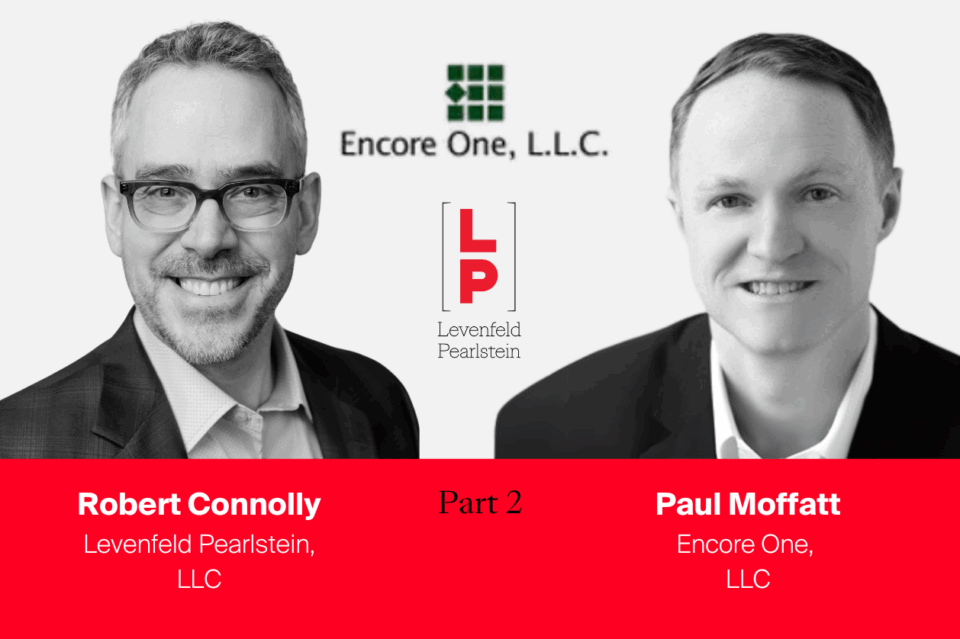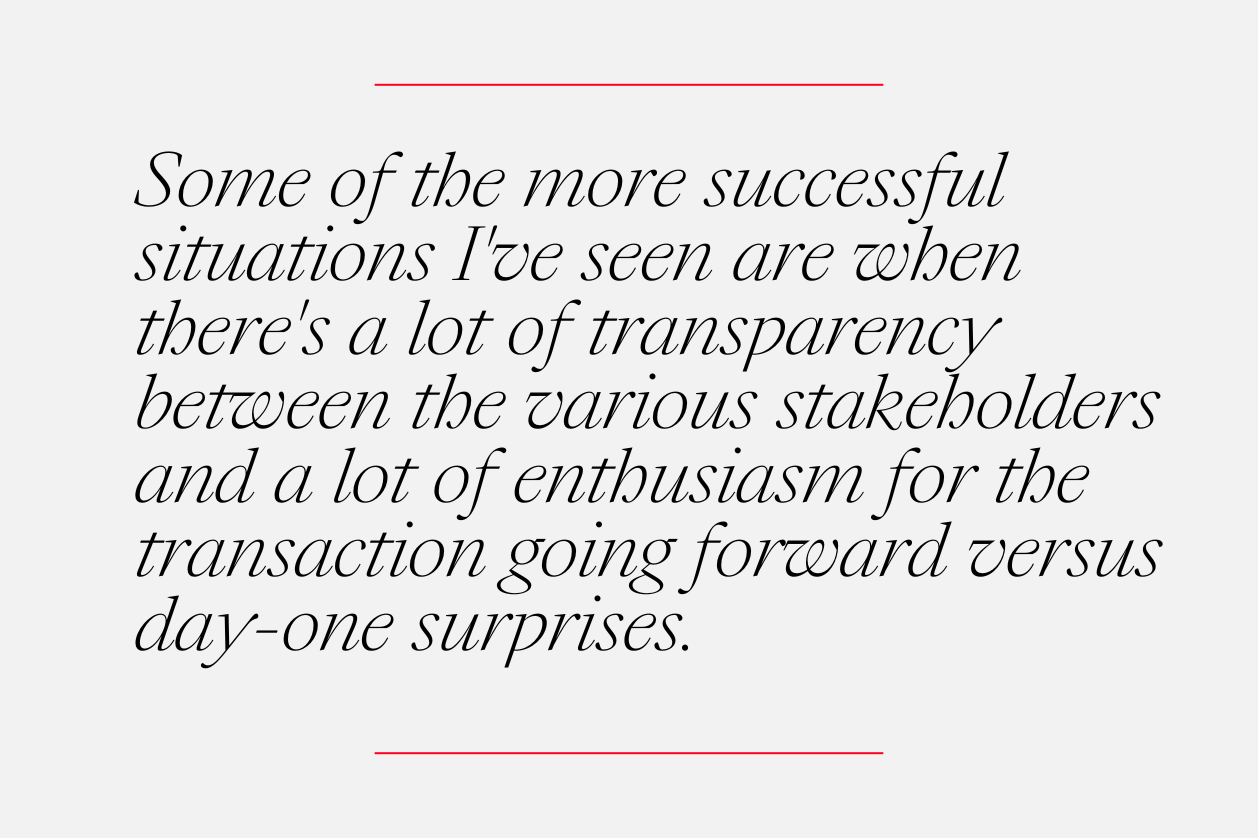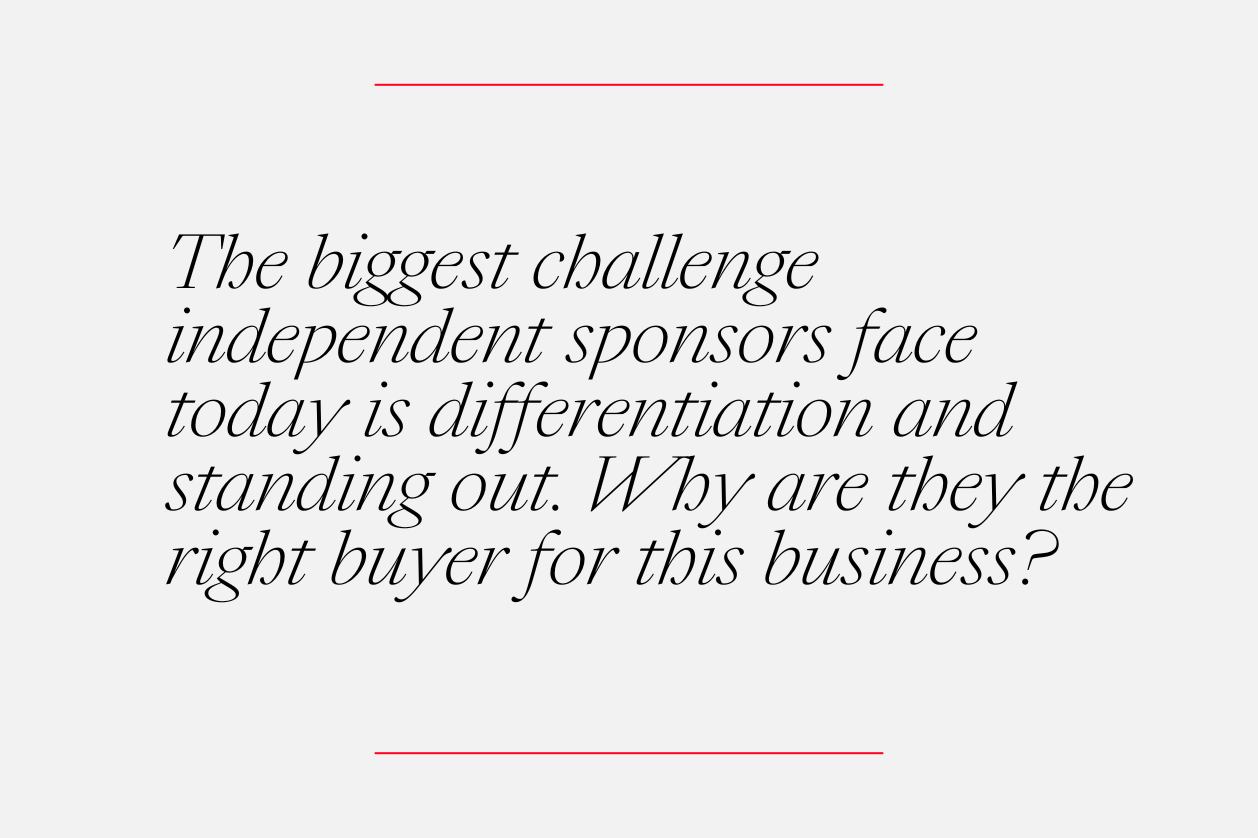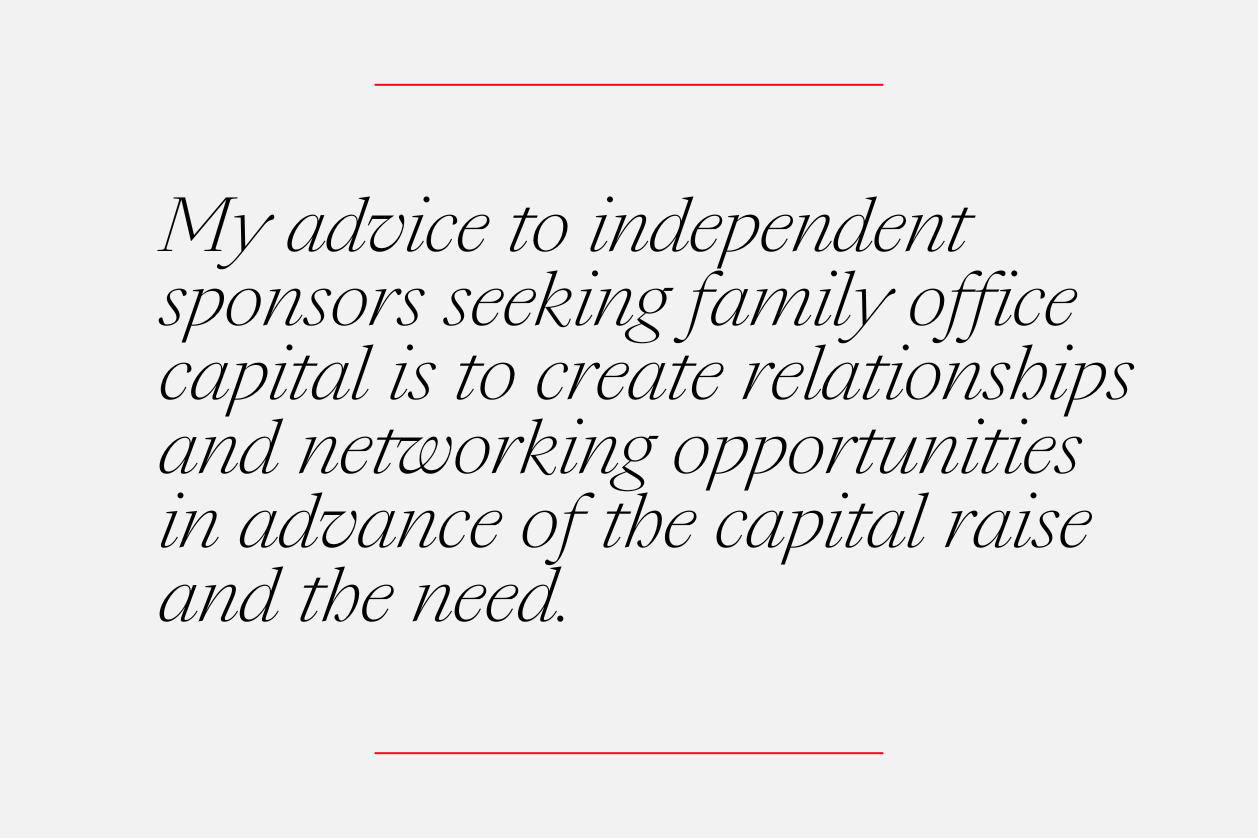Independent Sponsor Series – Capital Provider Spotlight: A Conversation with Paul Moffatt of Encore One (Part Two)

To help businesses, investors, and deal professionals better understand the evolving independent sponsor landscape, Robert Connolly – a partner in LP’s Corporate Practice Group and leader of LP’s Independent Sponsor team – shares a series of conversations with independent sponsors, capital providers and other professionals.
Below is his conversation with Paul Moffatt, Vice President of Encore One, a private holding company that historically acquired middle market businesses poised for long-term success and has recently shifted strategies to focus on direct minority equity co-investments alongside leading sponsors. With over 16 years of experience in commercial banking and sponsor finance, Paul sources and evaluates potential investments, structures and negotiates transactions, and works with portfolio companies.
In this second of a two-part Q&A, Paul describes the ideal independent sponsor, differentiating factors, and market trends. In part one, he explains Encore One’s investment strategy, relationship with independent sponsors, and approach to deal terms and structure.
The responses below have been edited slightly for brevity and clarity.
What is the ideal independent sponsor partner?
Experience, sophistication, and marketable attribution. That’s not always possible, but if we can draw a line from their experience to a new investment opportunity, whether it involves a similar industry, situation, or roll-up strategy, that’s ideal.
Unfortunately, we see a lot of similar opportunities. For instance, many residential service roll-ups, and although these markets are huge, they’re undifferentiated generally. Upon first meeting a sponsor, it’s a lot to expect that they have a better beat on rolling up the roofing or landscaping industry than somebody else with no prior experience doing it. It’s a relative comment to what other opportunities we’ve seen, and sometimes we see very experienced sponsors who have already rolled up the auto body repair industry in a former life in a different part of the country, and they have an army of advisors and operating partners under the form of an independent sponsor, and they’re pursuing a very similar opportunity. That’s an easy one to understand and get behind. In a world where we have multiple opportunities, you choose the one with highly relevant experience.
I’ve also been impressed with some of the independent sponsors who are narrowly focused. Maybe they don’t have direct prior experience, but they’ve got a thesis and a theme and are very focused. It might be a risky approach if you’re unlucky finding something within your theme. On the other hand, to the extent you are successful in finding something within your theme and you’re deep in an industry or network, hopefully that will make the sponsor more successful at finding the opportunity. It also resonates with Encore One as an investor.
When it comes to sponsor experience, track record is very important. To the extent we can verify track record or the sponsor can offer us referrals or references, that’s all very helpful. The independent sponsor usually expects that investors might investigate their background, connect a few dots, or verify their experience, integrity, and quality.
Regarding financial commitment, the more, the better. But that’s easier said than done sometimes.
As far as a sponsor’s ability to execute and drive value post-close, it goes back to prior experience or a situation they can point to. If we’re talking about finding, acquiring, capitalizing, and integrating add-ons or consolidating other businesses, it depends on the size of the platform and the team available both at management and the sponsor.
It depends on whether the target company and the management team have done the activity required to drive the value creation plan before, which certainly helps fill any gaps for the sponsor. If the sponsor doesn’t have experience but it’s an attractive business and the investment thesis makes a lot of sense, we might say “call us in a year” when you can stitch two or three of these things together and demonstrate some level of integration. We don’t want to dilute prior investors who took a swing with a sponsor early on. We would expect to come in at a higher valuation potentially, but from our standpoint, it’s a higher quality business that may command a higher value. That’s certainly an approach we’ve offered and provided follow-on equity to an independent sponsor.
What makes an independent sponsor stand out in your selection process?
Maybe it sounds like trite window dressing, but the quality of materials and a deep analysis are important. If they’ve already spent time and money doing buy-side quality of earnings due diligence and have integrated that into their analysis and presentation, that goes a long way to demonstrate how serious they are. If they are thoughtful and ask the right questions that any new investor might ask, that level of inquiry is really appealing and stands out. You’d be surprised at the number of opportunities I see where they’re expecting some level of commitment, and there hasn’t been any work done yet. There are a lot of “chicken and egg” situations out there, but when there’s been quite a bit of work, that stands out and is unique.
It also depends on the sponsor’s goals. Do they want to have one or two businesses they’re focused on and have a team that reflects that? Or are they hoping to construct a diversified portfolio of 5-7 names? In that case, they either need the requisite team with experience now or they need a very clear plan for how they will develop their team because the commitment is not only about capital, but time, energy, and resources dedicated to this new investment. So, that’s really important as well.
Sometimes I see a sponsor who might be a former investment banker and knows what the exit comps should look like and they can tell you how large the industry is and how it’s growing, but there’s less attention to the feasibility and execution of the growth plan. There is nothing wrong with that kind of background or experience, but attention needs to be paid to the operations of the business and the organic opportunities to grow the business and create value as well. It could be a small team, but an aligned team with diversified experience – whether it’s private equity, operations, investment banking, or capital markets – is helpful. Maybe one or two of those people have quite a bit of experience and have a successful track record. A high-quality independent sponsor team goes a long way.
Independent sponsors who are an individual or two are a little more challenging, especially with a first deal. Those individuals often find success if they have a known local network they can rely on. But those are tough for first-time deals or introductions for us.
What would make you pass on an independent sponsor deal?
Some common issues that cause us to pass on a deal are the opposite of what I look for, such as lack of experience, lack of an institutional approach to underwriting or analysis, and obvious credit issues. In a world of many opportunities, we avoid single customer concentrations over 15-20%, project-based work, cyclical work, or seasonal work. A very low purchase price, whatever it might be, could be a mitigating factor that we would consider to be the reason it’s still a good deal. Some of those common prohibitions that most institutional investors have are the same from our perspective as well.

Another big issue is management succession, and “key person” risk related to a particular seller. Will the sponsor fill that gap? Do they have an operating partner or somebody in waiting who can support the business? Are they co-marketing the deal with a CEO who will run the business and work for an attractive management incentive plan? In other words, the quality of the management team going forward is very important. The level of connectivity they have with either the other leaders in the company or the seller helps avoid a situation where we’re not surprising employees when the seller has a new sponsor and a new CEO leading the business. Some of the more successful situations I’ve seen are when there’s a lot of transparency between the various stakeholders and enthusiasm for the transaction going forward versus day-one surprises.
What is the current environment for independent sponsor transactions?
Obviously, as we sit here today on April 11th, there’s been a lot of volatility in the public markets, which I’m sure has spooked many investors – from public investors to lower middle market investors and maybe business owners as well. It feels like a moment-in-time issue that might pass, but nobody knows.
That said, generally, I think it’s a great time for independent sponsors to find and complete transactions. I have some recency bias. As I said, we pivoted over the last 18 months to pursue co-investments and independent sponsors. I’ve been amazed at the number of third-party resources available to these types of transactions, as well as the quality of the sponsors and deal opportunities that they’re getting signed under LOI exclusivity. Some sophisticated folks who would otherwise have opportunities in large private equity funds have decided to go it alone. It speaks to the amount of capital supporting this maturing asset class, investment approach, and business model, as well as the number of sponsors out there to throw their hat in the ring. Ten years ago, it was a less sought-after investment profile and maybe even considered less- than, but it seems to be a very viable approach. Sellers, investment bankers, and other advisors with the proper due diligence have gotten past any bias against the independent sponsor approach.
So overall, the environment is great. Of course, the largest private equity funds continue to go up-market, and I don’t know that there have been many lower middle market private equity funds formed recently. Those that were originally formed in the ’90s are probably winding down by now, so I think it’s a ripe opportunity. Of course, for the significant Baby Boomer population of founder-run businesses who need to sell their companies, it’s a terrific time. There’s certainly a lot of activity and opportunity for independent sponsor transactions.
Have you seen shifts in deal structures, pricing, or capital availability?
I haven’t seen any shifts in structures. With pricing, buyers and sellers are generally on even footing these days. I’ve been doing this for almost 10 years, and there have been peaks and valleys. It was a hot time in 2021 and 2022, which may have sidelined some investors. Then there were higher rates, inflation and an election cycle, but the leverage that sellers probably once had has come back into equilibrium, so I don’t know that I’ve seen anything unusual. The more deals I see and the more deals I review, some of the pricing is predictable.
Occasionally, there’s an off-market or proprietary opportunity, and those might be a turn less in EBITDA, but those are also situations where there’s an attractive second bite at the apple for a rollover seller who’s maybe rolling 40% because the business is in an attractive, fast-growing market. They see the new independent sponsor and investor pool as able to support future growth for the business. In that case, the seller is really a buyer and seller in that transaction, and there’s quite a bit of upside with the next exit. In those, the entry multiples tend to be good, maybe a good turn or two less than a broad auction process would present for a larger share of the company.
There is plenty of capital available for good deals. The competition amongst independent sponsors continues to grow, so independent sponsors should always look for ways to differentiate themselves or the investment opportunity.
I see some deals, from time to time, that languish because of some of the reasons we previously discussed. Deals with an undifferentiated business, sponsor, team or value-creation plan can be challenging in a market with many opportunities.

The biggest challenge independent sponsors face today is differentiation and standing out. Why are they the right buyer for this business? A clear understanding of that is important for an investor. Maybe they have an amazing local relationship with that seller and there’s some trust that identifies why they got the deal, but I don’t know why they’re the natural buyer for it necessarily from a value creation standpoint. It’s important to be able to answer the question, why me? And if this is such a great business, why didn’t it get sold to a $300 million private equity fund? Being able to explain why they are the natural buyer for a business is very helpful.
Are you seeing increased competition among capital providers for independent sponsor-led deals?
Yes, as the model has grown, more capital has sought investments in these types of direct deals. For good deals, there’s increased competition. We’ve certainly pursued deals and made offers that become oversubscribed. On the one hand, it’s good that other people find this investment attractive, but on the other hand, we often get cut back. When we know it’s a hot deal or a good investment opportunity, we might suggest or give an indication of one level of capital commitment knowing that we might get cut back. There are definitely more capital providers pursuing these opportunities and the best ones get oversubscribed.
Alternatively, the occupational hazard of being an independent sponsor persists. If there’s some issue or the capital can’t be formed quickly, it might raise more suspicion than is helpful for the independent sponsor.
What advice do you have for independent sponsors seeking family office capital?

Given that independent sponsors are trying to thread a needle between LOI and close, finish their due diligence and raise equity and debt, an oversubscription situation is a great position to be in. Of course, you want to avoid the deal that gets extended because you can’t raise the capital.
That said, my advice to independent sponsors seeking family office capital is to create relationships and networking opportunities in advance of the capital raise and the need.
If a group is pursuing an investment thesis, provide information on that thesis ahead of time. Socialize with investors regarding future opportunities or early discussions with potential sellers and what those opportunities might look like. That would help move the relationship along more quickly when the opportunity arises or when the LOI is signed and they’re looking for capital commitments in short order.
Engage in relationship building and networking ahead of the ask. It’s hard to get something done if you’re under the gun and there’s pressure on both sides to make a decision. If not given enough time, it’s a lot to ask of investment professionals to make an investment decision after meeting one time.
How do you expect the independent sponsor model to evolve over the next five years?
It depends on the overall performance of the asset class and the business model. But that’s kind of hard to ascertain because a lot of these deals are not publicly identifiable, and it’s hard to track the success of one investment to the next. But from my perspective, I hope that the spectrum of fee structures narrows or coalesces to the middle. But even that I don’t necessarily see changing much over time. My one takeaway here is that the quality will continue to improve. It’s not going anywhere. There will probably be more market entrants – more new independent sponsors – but I would expect the quality will continue to improve. Sellers and advisors will be more accepting of independent sponsors. Quality individuals with different career experiences might enter the independent sponsor model network. Ultimately, while capital is available today, it’s still finite, so it will gravitate toward the best deals.
With competition amongst the independent sponsors, the quality of the underwriting and the sponsors, and how they present themselves and run the value creation plans will continue to improve.
I’d be interested to know your thoughts.
Robert Connolly: I agree with that. From the capital side, markets are always seeking to become more efficient. On the sponsor side, they are looking for the most efficient ways to source these opportunities depending on their investment thesis, whether through a pool of committed capital or more flexibility in the deal-by-deal model in the independent sponsor universe. In the lower middle market, I think the trend will continue to be more of the deal-by-deal independent sponsor model because the committed funds are harder to raise and harder to execute.
At this end of the market, capital has gotten comfortable with the deal-by-deal model, and it can be more efficient for capital to be put to work because they can identify the opportunities that match their investment objectives and partner up with the right sponsor. However, that puts pressure on the sponsors to show how they are differentiated. How are they bringing the right expertise? What team are they putting together to execute the value creation strategy? All of that will continue to improve in terms of overall efficiency because of the competition for deals and capital. We see that in terms of how these deals are structured and how independent sponsors are paid and incentivized through fees and carry structures. I think we will continue to see that coalescence around generally accepted practices for how the economics work. I think what’s going to really continue to change is the professionalization and differentiation of sponsors with a narrow focus.
Paul Moffatt: That’s right. It’s a bit of a chicken-or-the-egg situation. A sponsor has to get that first deal done. Individuals with a network to rely on can get some of those done on a relationship basis. There’s a number of steps to what you’re talking about – the differentiated group that can promote market expertise, value creation, and experience. I don’t think the competition will come from more private equity funds; it will come from more quality independent sponsors.
For more information on Paul Moffatt, visit his bio. For more information on Encore One, visit their website.
To read other articles in this series, please see here: Insights | LP (lplegal.com)
Interested in participating in a future interview series? Please contact Robert Connolly.
Filed under: Corporate, Independent Sponsors
Related insights
May 28, 2025